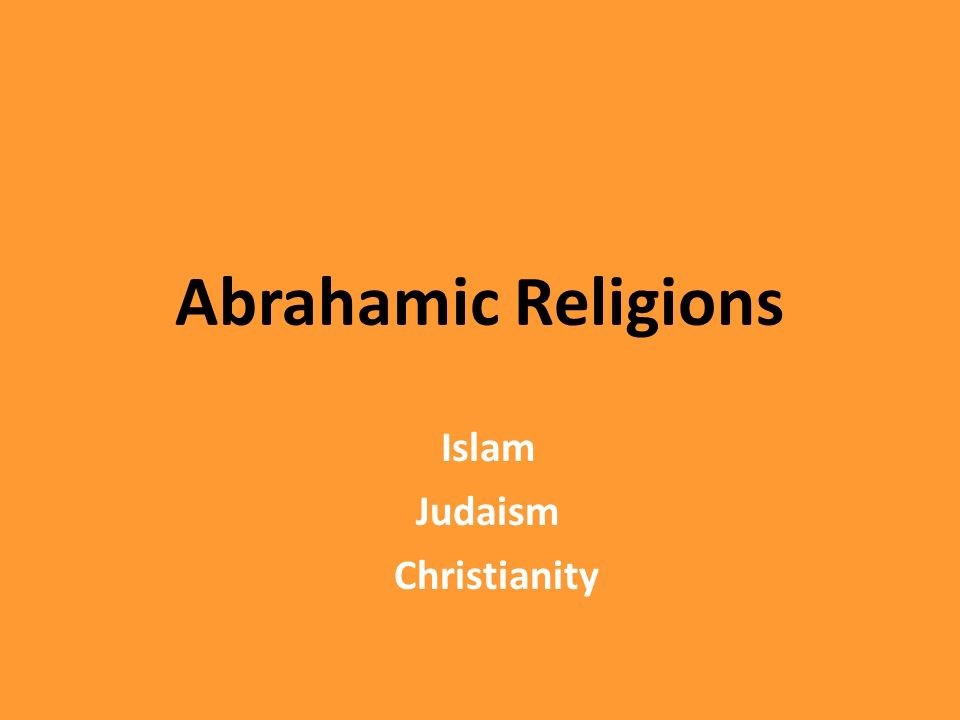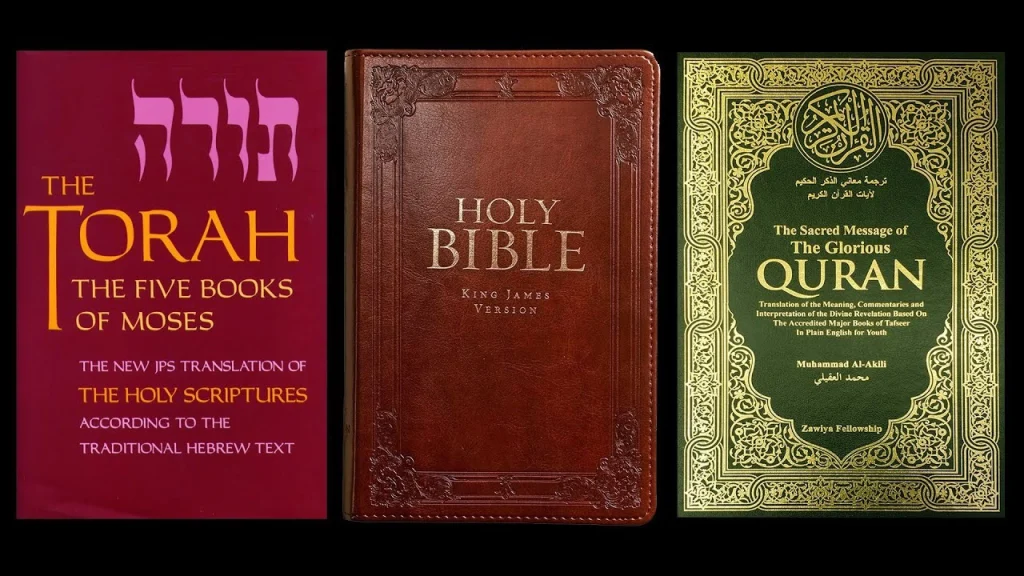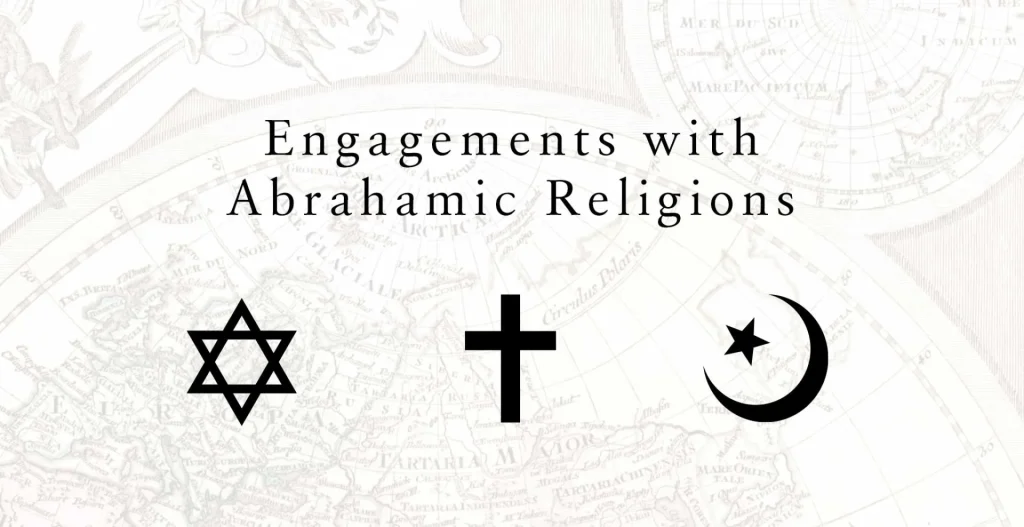The concept of God is a central theme in Judaism, Christianity, and Islam.
These three Abrahamic religions share common roots and a monotheistic framework, yet they offer distinct theological perspectives on the nature, attributes, and relationship of God with humanity.
God in Judaism
In Judaism, God is referred to as YHWH (Yahweh), emphasizing His eternal and self-existent nature. The Shema, a central declaration in Jewish prayer, proclaims, “Hear, O Israel: The Lord our God, the Lord is one” (Deuteronomy 6:4).
This underscores the absolute unity and singularity of God.
Key Attributes of God
- Transcendence and Immanence: God is both above and beyond creation (transcendent) while also being intimately involved in the world (immanent).
- Moral Authority: God is the source of morality and justice, exemplified through the Torah, which provides commandments (mitzvot) as a guide for righteous living.
- Covenantal Relationship: The covenant with Abraham and the Israelites reflects a unique bond between God and His chosen people.
Judaism views God as the ultimate creator, lawgiver, and sustainer of the universe. His transcendence signifies that He exists outside the physical realm, beyond human comprehension.
Yet, His immanence is reflected in the lives of individuals and the history of the Jewish people, seen as an ongoing relationship through acts of divine intervention.
The Torah, considered God’s revealed law, is central to Jewish life and worship. It contains commandments designed to bring individuals closer to God and promote ethical living. Through observance of these commandments, Jews affirm their commitment to the covenant, an enduring contract symbolizing God’s promises and expectations.
Prayer and worship also underscore the Jewish understanding of God. Daily prayers, including blessings and recitations like the Shema, serve to remind individuals of God’s presence in all aspects of life.
The synagogue plays a vital role as a house of prayer, study, and assembly, fostering communal worship and connection with the divine.
Throughout history, Jewish theology has adapted to circumstances such as exile, persecution, and modernity while maintaining its core belief in one God.
Rabbinic interpretations have enriched this understanding, offering insights into God’s nature and attributes, such as His mercy (Rachamim) and justice (Tzedek).
These attributes coexist harmoniously, reflecting a God who is both compassionate and fair.
Judaism’s focus on monotheism distinguishes it from polytheistic traditions and underscores its influence on Christianity and Islam. The ethical monotheism it espouses—rooted in the idea that God demands moral conduct from humanity—has shaped the moral and spiritual landscape of the world.
God’s Role in Jewish Life
In Jewish thought, God is not a distant deity but an active participant in the world. Stories of the patriarchs, prophets, and deliverance from Egypt demonstrate His involvement in guiding and protecting His people.
These narratives affirm God’s faithfulness to the covenant and His responsiveness to human actions, rewarding obedience and punishing transgression.
The messianic hope in Judaism also reflects beliefs about God’s ultimate plan for the world.
The arrival of the Messiah is seen as a fulfillment of God’s promise to establish a kingdom of peace and justice. This eschatological vision reinforces trust in God’s sovereignty and the belief that history is moving toward divine redemption.
In contemporary Judaism, God remains central to identity and practice, though interpretations vary among different movements such as Orthodox, Conservative, and Reform Judaism.
These perspectives range from a strict adherence to traditional beliefs and practices to more modern interpretations that emphasize individual spirituality and ethical living.
Judaism’s emphasis on God’s unity, moral authority, and covenantal relationship continues to inspire devotion and resilience among its followers.
The belief in a singular, just, and compassionate God provides a foundation for Jewish life and a source of hope and guidance in an ever-changing world.

God in Christianity
Christianity centers its understanding of God through the doctrine of the Trinity: one God in three persons—Father, Son (Jesus Christ), and Holy Spirit.
This Trinitarian concept is unique to Christianity and distinguishes it from Judaism and Islam.
Key Attributes of God
- God as Father: The Creator and sustainer of the universe, embodying love and authority.
- Jesus Christ as Divine: God incarnate who redeems humanity through His death and resurrection.
- Holy Spirit: God’s presence within believers, guiding and empowering them for righteous living.
The Bible, Christianity’s sacred scripture, reveals God’s character and His relationship with humanity. In the Old Testament, God is portrayed as the Creator, lawgiver, and covenant-maker, laying the foundation for His plan of salvation.
The New Testament introduces the life and teachings of Jesus Christ, who is viewed as God incarnate, bringing the message of grace, forgiveness, and eternal life.
Central to Christian belief is the understanding of God as love (1 John 4:8). This love is demonstrated through Jesus Christ’s sacrifice, described as an act of redemption for humanity’s sins.
The crucifixion and resurrection of Jesus form the cornerstone of Christian theology, highlighting God’s mercy and justice.
The doctrine of the Trinity further defines God’s nature in Christianity. The Father is often associated with creation and divine authority, the Son with redemption and revelation, and the Holy Spirit with sanctification and empowerment.
While this concept is complex, it emphasizes the relational and communal nature of God, who exists as three distinct persons yet remains one essence.
Christian worship reflects this understanding of God through practices like prayer, hymns, and sacraments.
The Eucharist, also known as Communion or the Lord’s Supper, symbolizes Jesus’ sacrifice and serves as a reminder of God’s love and presence. Baptism signifies entry into the Christian community and the believer’s commitment to following God.
God’s attributes in Christianity also include omnipotence, omniscience, and omnipresence. He is viewed as a personal God who desires a relationship with humanity.
This relationship is cultivated through faith, prayer, and adherence to biblical teachings. The concept of grace—unmerited favor from God—is pivotal, emphasizing that salvation is a gift rather than something earned through works.
Christianity also emphasizes God’s kingdom, a spiritual reign that will culminate in the return of Christ and the establishment of a new heaven and earth.
This eschatological hope provides comfort and motivation for believers, encouraging them to live according to God’s will.
Throughout history, Christian theology has evolved to address various cultural, philosophical, and doctrinal challenges.
From the early church fathers to modern theologians, interpretations of God’s nature and attributes have continued to shape Christian thought and practice.
God in Islam
Islam, one of the major monotheistic religions, emphasizes the belief in one God, known in Arabic as Allah. The concept of God in Islam is deeply rooted in the Quran, the holy book of Muslims, and is central to the faith. This belief is encapsulated in the first part of the Shahada, the Islamic declaration of faith: “There is no god but Allah.” Understanding Allah’s attributes, relationship with humanity, and role in creation provides a comprehensive insight into this fundamental concept.
The Oneness of God (Tawhid)
The most critical aspect of God in Islam is Tawhid, or the absolute oneness and uniqueness of Allah. Tawhid implies that Allah is singular, without partner or equal, and nothing can be compared to Him. Verse 111 of Surah Al-Isra in the Quran emphasizes the concept of monotheism at three levels: First, it declares that God has no offspring (“He begets not”), indicating He is complete and has no need for descendants.
Second, it asserts that God has no partner in His sovereignty (“nor is there to Him any partner in dominion”), underscoring His unmatched authority and absolute rule. Third, it states that God requires no protector out of weakness (“nor does He need a protector out of weakness”), affirming His ultimate power and independence.
These three points illustrate the Islamic principle of God’s singularity, supremacy, and self-sufficiency.
Attributes of Allah
Allah’s attributes, as described in the Quran and the Sunnah (sayings of the Prophet Muhammad), highlight His perfection and infinite nature. These attributes are often referred to as Names of Allah (Asma’ul Husna), which include:
- Al-Rahman (The Most Merciful) and Al-Rahim (The Most Compassionate): Reflect Allah’s boundless mercy and love for His creation.
- Al-Alim (The All-Knowing): Denotes Allah’s infinite knowledge of all things, past, present, and future.
- Al-Khaliq (The Creator): Highlights Allah’s role as the originator of everything in existence.
Also Verses 22 to 24 of Surah Al-Hashr present a beautiful collection of Allah’s most perfect and exalted names, known as Asmaul Husna.
These verses highlight His supreme attributes, such as being the All-Knowing (Al-‘Aleem), the All-Wise (Al-Hakeem), the Sovereign (Al-Malik), the Holy (Al-Quddus), the Source of Peace (As-Salam), and the Guardian (Al-Muhaymin). By reflecting on these names, believers are reminded of Allah’s infinite power, wisdom, and mercy, which serve as a source of inspiration and guidance in their lives.
These verses encapsulate the essence of divine attributes, encouraging deep contemplation and worship of Allah These names are not mere descriptors but indicate how Allah interacts with the universe and His creation.
They encourage believers to reflect on these attributes and emulate them in their own lives to the extent humanly possible.
Allah’s Relationship with Creation
In Islam, Allah is both transcendent and immanent. His transcendence means that He is above and beyond His creation, not limited by time, space, or physical form.
This is highlighted in the Quran:
“Vision perceives Him not, but He perceives [all] vision; and He is the Subtle, the Acquainted.” (Surah Al-An’am: 103)
Despite His transcendence, Allah is immanently involved in His creation. He is close to every individual:
“And We have already created man and know what his soul whispers to him, and We are closer to him than [his] jugular vein.” (Surah Qaf: 16)
This dual aspect of Allah’s relationship—His majesty and intimacy—establishes a balance between awe and love in the hearts of believers.
God as the Creator and Sustainer
Allah is recognized as the sole creator and sustainer of the universe. Every element of existence, from the vast galaxies to the tiniest atom, is a manifestation of His creative power.
The Quran frequently invites humans to observe the natural world as evidence of Allah’s greatness:
“Indeed, in the creation of the heavens and the earth and the alternation of the night and the day are signs for those of understanding.” (Surah Al-Imran: 190)
Allah is not only the creator but also the sustainer of life. He provides for all living beings, maintaining the balance of ecosystems and ensuring the continuation of life. His providence is highlighted in the Quran:
“And there is no creature on earth but that upon Allah is its provision, and He knows its place of dwelling and place of storage. All is in a clear register.” (Surah Hud: 6)
Mercy and Forgiveness
One of the most emphasized qualities of Allah in Islam is His mercy and forgiveness. Every chapter of the Quran (except one) begins with the phrase “In the name of Allah, The Most Merciful, The Most Compassionate.” Allah’s mercy is vast and encompasses all beings:
“My mercy encompasses all things.” (Surah Al-A’raf: 156)
Verse 53 of Surah Az-Zumar is a powerful message of hope and mercy from Allah.
It says: “Say, ‘O My servants who have transgressed against themselves [by sinning], do not despair of the mercy of Allah. Indeed, Allah forgives all sins. Indeed, it is He who is the Forgiving, the Merciful.'” This verse highlights the boundless compassion of Allah, encouraging believers to seek His forgiveness no matter the extent of their wrongdoings. It reassures that Allah’s mercy is greater than any sin, providing solace and motivation for repentance and spiritual renewal.
Guidance and Accountability
Allah, in His wisdom, provides guidance to humanity through prophets and revelations. The Quran is viewed as the final and most comprehensive guide, offering instructions for all aspects of life. Allah’s guidance is a sign of His care for humanity:
“Indeed, this Quran guides to that which is most upright.” (Surah Al-Isra: 9)
In Islam, even the prophets are held accountable and questioned, as highlighted in Surah Al-A’raf, Ayah 6: “Then We will surely question those to whom [a message] was sent, and We will surely question the messengers.” This verse emphasizes that everyone, including prophets, will be questioned about their duties and actions.
Additionally, Surah Al-Muddathir, Ayah 38 states: “Every soul, for what it has earned, will be retained.” This underscores the Islamic principle that every individual is responsible for their own deeds and will be held accountable for their actions.
Together, these verses illustrate the concept of personal responsibility and accountability in Islam, reinforcing that no one is exempt from divine judgment, regardless of their status.
Worship and Devotion
The central purpose of life in Islam is to worship Allah. Worship is not limited to rituals like prayer and fasting but extends to every action performed with the intention of seeking Allah’s pleasure. This holistic approach transforms daily activities into acts of devotion.
The Quran says:
“And I did not create the jinn and mankind except to worship Me.” (Surah Adh-Dhariyat: 56)
This worship fosters a deep connection with Allah and aligns human actions with divine will.
Unity of God Across Faiths
Islam acknowledges the belief in one God as a shared foundation with other Abrahamic faiths, such as Judaism and Christianity.
The Quran refers to Allah as the same God worshiped by previous prophets like Abraham, Moses, and Jesus, emphasizing continuity in divine revelation:
“And argue not with the People of the Scripture except in a way that is best, except for those who commit injustice among them, and say, ‘We believe in that which has been revealed to us and revealed to you; and our God and your God is one; and we are Muslims [in submission] to Him.'” (Surah Al-Ankabut: 46)

Comparative Analysis
Judaism, Christianity, and Islam are three major monotheistic religions that stem from the Abrahamic tradition. Central to their teachings is the belief in one God, the Creator and Sustainer of the universe. While they share this fundamental principle, each religion has a distinct theological understanding of God’s essence, attributes, and relationship with humanity.
This analysis delves into the similarities and differences among these faiths regarding their conception of God.
1. The Core Belief in Monotheism
Judaism: Strict Monotheism
Judaism emphasizes the absolute oneness of God, a concept known as Shema:
“Hear, O Israel: The Lord our God, the Lord is One.” (Deuteronomy 6:4)
In Jewish theology, God is referred to by names such as Yahweh and Elohim. God is eternal, unchanging, and indivisible.
strict monotheism leaves no room for the idea of a divine plurality or intermediaries.
God is transcendent and personal, actively engaging with humanity, particularly through His covenant with the Jewish people.
Christianity: Monotheism with the Trinity
Christianity professes belief in one God but introduces the concept of the Trinity, wherein God exists as three distinct but co-equal persons: The Father, the Son (Jesus Christ), and the Holy Spirit. The Nicene Creed declares:
“We believe in one God, the Father Almighty… and in one Lord Jesus Christ… and in the Holy Spirit.”
The Trinity, central to Christian theology, signifies that God is one in essence but exists in a triune nature. This distinguishes Christianity from Judaism and Islam, as it intertwines monotheism with a complex, relational structure within God Himself.
Islam: Pure Monotheism (Tawhid)
Islam upholds strict monotheism, termed Tawhid. The Quran emphasizes the uniqueness and singularity of Allah:
“Say, ‘He is Allah, [who is] One. Allah, the Eternal Refuge. He neither begets nor is born, nor is there to Him any equivalent.’” (Surah Al-Ikhlas: 1–4)
Allah’s oneness is absolute, rejecting any division, association, or partnership in divinity. Islam considers the concept of the Trinity to contradict true monotheism and insists that Allah is beyond human comprehension.
Comparison: Judaism and Islam share a similar stance on monotheism, emphasizing God’s indivisibility. Christianity’s concept of the Trinity is unique, combining monotheism with a tri-personal understanding of God.
2. The Nature and Attributes of God
Judaism: A Just and Merciful God
Judaism portrays God as omniscient, omnipotent, and omnipresent. He is both just and merciful, demanding adherence to His laws while offering forgiveness and compassion. The Jewish understanding of God focuses on His covenantal relationship with the Israelites, emphasizing His role as their protector and guide. God is also described as transcendent and ineffable, beyond full human understanding, yet He reveals Himself through the Torah and prophets.
Christianity: The God of Love and Grace
Christianity emphasizes God’s attributes of love and grace. While sharing Judaism’s view of God’s omnipotence and omniscience, Christianity introduces the concept of God’s incarnation in Jesus Christ. This belief highlights God’s willingness to enter human history and experience suffering for humanity’s salvation. The New Testament portrays God as a loving Father who offers unmerited favor (grace) to sinners through the sacrifice of Jesus. God’s immanence is further emphasized through the Holy Spirit, who dwells within believers.
Islam: The All-Merciful and All-Powerful
In Islam, Allah is described by many names (Asma’ul Husna), each reflecting His attributes, such as Ar-Rahman (The Most Merciful) and Al-Rahim (The Most Compassionate). These attributes emphasize Allah’s mercy, power, justice, and wisdom.
While Allah is transcendent and beyond human likeness, He is also intimately involved in the lives of His creation. His mercy is described as encompassing all things:
“My mercy encompasses all things.” (Surah Al-A’raf: 156)
Comparison: All three faiths describe God as merciful, just, and omnipotent. Christianity uniquely emphasizes God’s incarnation and relational aspect through Jesus Christ, while Judaism and Islam maintain a focus on God’s transcendence and covenantal roles.
3. Revelation and God’s Interaction with Humanity
Judaism: The Covenant and the Torah
In Judaism, God reveals Himself through the Torah and the prophets. The Torah, given to Moses, serves as the ultimate guide for moral and spiritual life. God’s covenant with Abraham, reaffirmed with Moses, is a central theme. This covenant establishes a reciprocal relationship, wherein the Israelites are chosen to uphold God’s commandments and serve as a light to the nations.
Christianity: Jesus Christ and the Bible
Christianity teaches that God’s ultimate revelation is through Jesus Christ, who is considered God incarnate. The New Testament complements the Old Testament, expanding on God’s message of salvation and grace. Through Jesus, Christians believe they gain direct access to God. This revelation emphasizes a personal and transformative relationship with God, made possible through faith in Jesus.
Islam: The Quran and Prophethood
In Islam, Allah reveals His will through the Quran, delivered to Prophet Muhammad (peace upon him) by the Angel Jibreel (Gabriel). The Quran is regarded as the final and complete revelation, superseding previous scriptures. Islam teaches that prophets, including Adam, Noah, Abraham, Moses, and Jesus, were sent to guide humanity, but Muhammad (peace upon him) is the Seal of the Prophets, bringing Allah’s ultimate message.
Comparison: Judaism and Islam emphasize divine guidance through laws and commandments, while Christianity focuses on the salvific role of Jesus Christ as the incarnation of God. Quran serves as the final and unaltered revelation of God’s will.

4. Worship and Devotion
Judaism: Obedience and Community Worship
Worship in Judaism involves prayer, study of the Torah, and observance of commandments. Practices such as the Sabbath, Passover, and Yom Kippur connect the community to God and their shared heritage. Worship is centered in synagogues and emphasizes both individual and communal responsibility.
Christianity: Sacraments and Personal Faith
Christian worship varies among denominations but typically includes prayer, hymns, sacraments (e.g., baptism and communion), and scripture reading. Jesus Christ is often the focal point of worship, seen as the mediator between God and humanity. Worship emphasizes personal faith, grace, and community gatherings, often in churches.
Islam: The Five Pillars
In Islam, “Usul al-Din” (Principles of Religion) are the fundamental beliefs that every Muslim must have faith in. These principles consist of three main components:
- Tawhid (Monotheism): This means believing in the oneness of God. It emphasizes that God is singular, without any partners or equals. God is the sole Creator and Sustainer of the universe, and nothing shares in His divinity.
- Nubuwwah (Prophethood): This involves believing in the prophets sent by God to guide humanity. Muslims believe that God sent many prophets throughout history, with Muhammad (peace be upon him) being the final prophet. Prophets are the messengers who convey God’s guidance to people.
- Ma’ad (Resurrection): This refers to the belief in the Day of Judgment and life after death. Muslims believe that all humans will be resurrected after death and held accountable for their deeds on the Day of Judgment. Rewards or punishments will be given based on one’s actions in this world.
In contrast to Usul al-Din (Principles of Religion), there are “Furu’ al-Din” (Branches of Religion), which refer to the practical aspects of Islamic worship and daily life, such as prayer, fasting, charity, and pilgrimage.
To put it simply:
- Usul al-Din: Relates to “beliefs” and faith.
- Furu’ al-Din: Relates to “actions” and “worship practices.”
These acts of worship are expressions of submission to Allah and emphasize His oneness.
Comparison: Worship in all three religions includes prayer and scripture, but Islam and Judaism focus more on structured rituals, while Christianity often emphasizes personal faith and sacraments.
5. Judgment and the Afterlife
Judaism: Collective Redemption
Judaism emphasizes the coming of the Messiah, who will establish God’s kingdom on Earth. The afterlife is less detailed, with a greater focus on moral living and the collective redemption of Israel.
Christianity: Salvation through Jesus
Christianity teaches individual salvation through faith in Jesus Christ. Eternal life in heaven or hell is determined by one’s relationship with God, as revealed through Jesus. The Second Coming of Christ will bring final judgment.
Islam: Accountability before Allah
Islam emphasizes personal accountability, where each individual is judged by Allah on the Day of Judgment. Those who follow Allah’s guidance and perform righteous deeds are rewarded with paradise (Jannah), while others face hell (Jahannam).
Comparison: All three religions teach divine judgment, but Christianity uniquely ties salvation to Jesus, while Judaism and Islam emphasize adherence to divine laws.
Heaveny Words Website: Bridging Faiths
The Heaveny Words website serves as a platform for exploring the Abrahamic faiths through comparative studies, emphasizing interfaith dialogue and understanding. It offers resources, articles, and courses on Judaism, Christianity, and Islam, focusing on their influence on culture and society. By fostering conversations about shared values and theological distinctions, Heaveny Words aims to build bridges between communities and promote a harmonious coexistence.
In Conclusion The concept of God in Judaism, Christianity, and Islam reveals both diversity and unity within the Abrahamic traditions. By exploring these perspectives, believers and scholars can gain insights into the richness of these faiths and the shared goal of seeking the divine. Through platforms like Heaveny Words, interfaith engagement can continue to flourish, nurturing a world of mutual respect and understanding.



